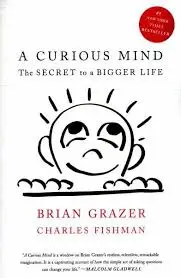
A Curious Mind
The Secret to a Bigger Life
Brian Grazer & Charles Fishman
Simon & Schuster (2015)
- Intellectual, Social
- Book, Premium Content, Resource Summary
Key Takeaways
- Curiosity is a skill you can practice. Small, honest questions open doors to new knowledge and relationships—crucial when FND makes the world feel unpredictable.
- Questions build confidence. Redirect anxious energy into guided curiosity (“What can I learn from this?”) to ease symptom-related worries and cognitive fog.
- Connection starts with listening. Grazer’s “curiosity conversations” show how genuine interest deepens bonds—an antidote to the isolation common in FND.
- Preparation matters. Doing a little homework before appointments, support-group calls, or therapy sessions helps you get the answers you need.
Click to read full summary
The Essentials
Hollywood producer Brian Grazer credits his success to one simple habit: scheduling regular “curiosity conversations” with people far outside his everyday circle. Over 35 years, these ten-minute chats—from scientists to presidents—taught him that a better life isn’t about having all the answers, but about asking better questions. His stories illustrate how curiosity fuels creativity, confidence, and meaningful relationships.
For the FND community, Grazer’s message is especially powerful. Symptoms often disrupt daily routines, shrink social circles, and stir self-doubt. Practicing curiosity—through brief, low-pressure questions—offers a practical way to reconnect with the world, keep the brain engaged, and find fresh strategies for living well.
Why This Matters for FND
Curiosity is an energy-efficient tool for navigating cognitive fatigue, anxiety, and the feeling of being dismissed. By replacing self-criticism (“Why can’t I do more?”) with targeted curiosity (“What small adjustment might help today?”), you create space for problem-solving and compassion—key ingredients in symptom self-management.
Resource Qualities
Applicability
Accessibility
Evidence-Based
Practical Value
Practical Applications
For Individuals with FND
Low-Energy Days
- Jot down one genuine question about something around you (a bird outside, a headline, a symptom change). The act of wondering keeps the mind engaged without draining energy.
Building Long‑Term Wellness
- Start a “curiosity journal.” Each week, schedule a 10-minute call, podcast listen, or article on a topic you know little about. Track what lifts your mood or sparks new coping ideas.
For Care Partners
Supporting Your Loved One
- Instead of asking “How are you feeling?” try “What was one interesting thing that happened today?”—inviting richer conversation without pressuring for a health report.
Caring for Yourself
- Use curiosity to notice your own stress signals (“What’s my body telling me right now?”) and choose one quick reset (breathing break, stretch).
- Plan monthly “learning dates” (book club, webinar) unrelated to FND. Nurturing your interests protects against burnout.
When This is Most Helpful
- Newly Diagnosed: Reframe overwhelm as a quest for bite-size questions.
- During Symptom Flares: Use low-effort curiosity prompts to stay mentally active without overstimulation.
- Care-Partner On-Ramps: Great primer for loved ones learning how to ask supportive, empowering questions.
This summary is provided for informational purposes only and does not constitute medical, financial, or legal advice. It is not intended to replace professional consultation or treatment. Always consult qualified providers regarding your specific circumstances, symptoms, or questions.
